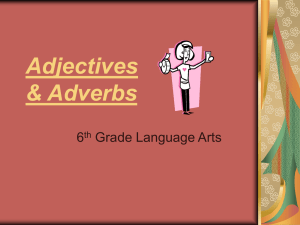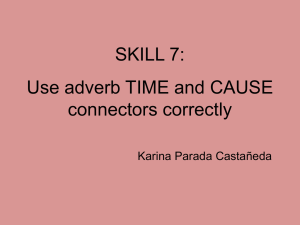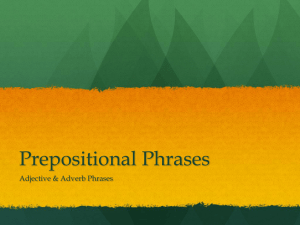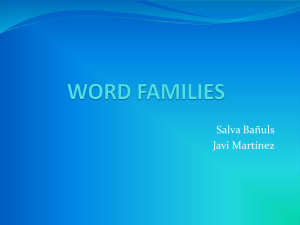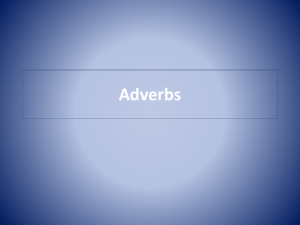Lesson 6
advertisement
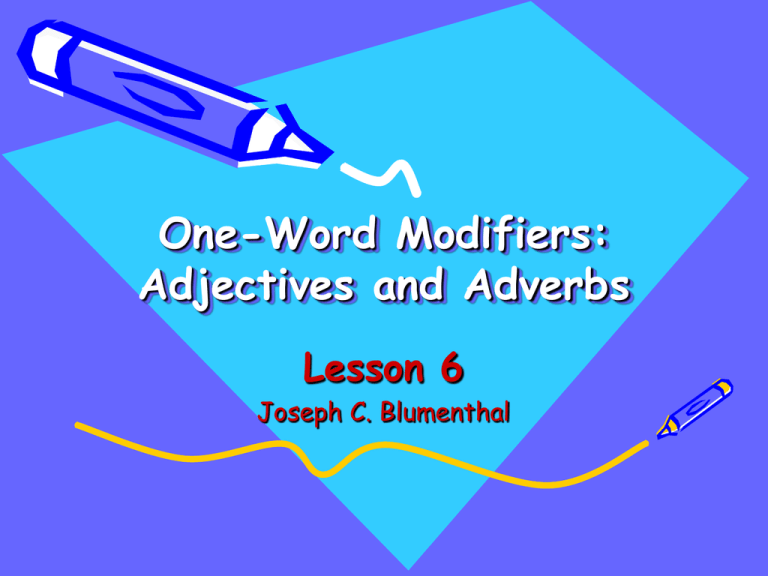
One-Word Modifiers: Adjectives and Adverbs Lesson 6 Joseph C. Blumenthal Reviewing Basic Sentence Patterns Until this point we have been dealing mainly with only the framework of sentences—subjects, verbs, and sometimes complements. Brakes cause accidents. Does this sentence contain any words that are not part of its framework? (Yes, No) Reviewing Basic Sentence Patterns Until this point we have been dealing mainly with only the framework of sentences—subjects, verbs, and sometimes complements. Brakes cause accidents. Does this sentence contain any words that are not part of its framework? (Yes, No) Reviewing Basic Sentence Patterns To supply additional information about the various parts of the sentence framework, we use modifiers. Poor brakes cause many accidents. This sentence contains two modifying words that are not part of its framework. These two words are: ________ and ________. Reviewing Basic Sentence Patterns To supply additional information about the various parts of the sentence framework, we use modifiers. Poor brakes cause many accidents. This sentence contains two modifying words that are not part of its framework. These two words are: __ Poor __ and _ many __. Reviewing Basic Sentence Patterns Poor brakes cause many accidents. The word Poor modifies the noun ______. The word many modifies the noun ______. Reviewing Basic Sentence Patterns Poor brakes cause many accidents. The word Poor modifies the noun brakes. The word many modifies the noun ______. Reviewing Basic Sentence Patterns Poor brakes cause many accidents. The word Poor modifies the noun brakes. The word many modifies the noun accidents. Words that modify nouns and pronouns are adjectives. Adjectives modify ________ different class of words. (How many?) Words that modify nouns and pronouns are adjectives. Adjectives modify ___two__ different class of words. (How many?) An adjective makes the meaning of a noun or pronoun more exact by telling what kind, which one(s), or how many. Which adjective tells what kind? these roads wide roads three roads An adjective makes the meaning of a noun or pronoun more exact by telling what kind, which one(s), or how many. Which adjective tells what kind? these roads wide roads three roads Which adjective points out which one? comfortable chairs one chair this chair Which adjective points out which one? comfortable chairs one chair this chair Which adjective tells how many? modern houses these houses several houses Which adjective tells how many? modern houses these houses several houses This sentence contains three nouns: Three students received perfect scores on this test. How many adjectives does this sentence contain? This sentence contains three nouns: Three students received perfect scores on this test. How many adjectives does this sentence contain? three This sentence contains three nouns: Three students received perfect scores on this test. Each adjective comes (before, after) the noun it modifies. This sentence contains three nouns: Three students received perfect scores on this test. Each adjective comes (before, after) the noun it modifies. Besides coming right before the nouns they modify, adjectives are sometimes found in another position. The car is blue. The eggs are fresh. The house looks new. The adjectives in these sentences follow linking verbs and are therefore (subject compliments, direct objects). Besides coming right before the nouns they modify, adjectives are sometimes found in another position. The car is blue. The eggs are fresh. The house looks new. The adjectives in these sentences follow linking verbs and are therefore (subject compliments, direct objects). The car is blue. The eggs are fresh. The house looks new. When adjectives are subject compliments, they come (before, after) the nouns they modify. The car is blue. The eggs are fresh. The house looks new. When adjectives are subject compliments, they come (before, after) the nouns they modify. a. Melba Moore has an excellent voice. b. Melba Moore’s voice is excellent. Does the adjective excellent come after the noun it modifies in sentence a or b? a. Melba Moore has an excellent voice. b. Melba Moore’s voice is excellent. Does the adjective excellent come after the noun it modifies in sentence a or b? Adjectives normally come before the nouns they modify except when they are ________ compliments. Adjectives normally come before the nouns they modify except when they are _subject_ compliments. Most people are honest. The two adjectives—Most and honest—modify the noun __________. (which noun?) Most people are honest. The two adjectives—Most and honest—modify the noun __people___. (which noun?) We very seldom use adjectives before pronouns as we do before nouns. We say, “a pretty girl,” but not “a pretty she”; “a new book,” not “ a new it.” She looks very pretty. It is new. In these sentences, the adjectives come (before, after) the pronouns they modify. We very seldom use adjectives before pronouns as we do before nouns. We say, “a pretty girl,” but not “a pretty she”; “a new book,” not “ a new it.” She looks very pretty. It is new. In these sentences, the adjectives come (before, after) the pronouns they modify. We have seen that adjectives answer the questions What kind? Which one(s)? and How many? About nouns and __________. We have seen that adjectives answer the questions What kind? Which one(s)? and How many? About nouns and _pronouns__. We need another class of words to answer the questions that we might ask about the action verbs. George drove. (When? Where? How? How much? How often?) Are the questions in parentheses about George or drove? We need another class of words to answer the questions that we might ask about the action verbs. George drove. (When? Where? How? How much? How often?) Are the questions in parentheses about George or drove? George drove safely. Which question does the word safely answer? When? Where? How? How much? How often? George drove safely. Which question does the word safely answer? When? Where? How? How much? How often? George drove yesterday. Which question does the word yesterday answer? When? Where? How? How much? How often? George drove yesterday. Which question does the word yesterday answer? When? Where? How? How much? How often? George drove frequently. Which question does the word frequently answer? When? Where? How? How much? How often? George drove frequently. Which question does the word frequently answer? When? Where? How? How much? How often? George drove away. Which question does the word away answer? When? Where? How? How much? How often? George drove away. Which question does the word away answer? When? Where? How? How much? How often? Words that modify verbs are called adverbs. The fact that the word adverb contains the word verb will help you to remember that adverbs modify __________. Words that modify verbs are called adverbs. The fact that the word adverb contains the word verb will help you to remember that adverbs modify __verbs___. Many adverbs—especially those that tell how—end with –ly. In fact, we form many adverbs by adding –ly to adjectives: polite—politely, graceful—gracefully, fearless— fearlessly. A carful person drives carefully. The adverb in this sentence is ________. Many adverbs—especially those that tell how—end with –ly. In fact, we form many adverbs by adding –ly to adjectives: polite—politely, graceful—gracefully, fearless— fearlessly. A carful person drives carefully. The adverb in this sentence is carefully. We have seen that adjectives have a fixed position in the sentence— usually before the words they modify. Most adverbs, by contrast, are very movable. I finally finished the final chapter. The word that can be shifted to another position is the (adjective final, adverb finally). We have seen that adjectives have a fixed position in the sentence— usually before the words they modify. Most adverbs, by contrast, are very movable. I finally finished the final chapter. The word that can be shifted to another position is the (adjective final, adverb finally). * Our friends * have * come * for dinner *. Can the adverb often be inserted in the sentence at each point indicated by an asterisk (*)? (Yes, No) * Our friends * have * come * for dinner *. Can the adverb often be inserted in the sentence at each point indicated by an asterisk (*)? (Yes, No) Because adverbs are often moveable, we frequently find them several words away from the verbs they modify. Aunt Mary talks about politics continually. The adverb continually modifies the verb __________. Because adverbs are often moveable, we frequently find them several words away from the verbs they modify. Aunt Mary talks about politics continually. The adverb continually modifies the verb __ talks __. a. One of the windows occasionally sticks. b. One of the windows sticks occasionally. c. Occasionally one of the windows sticks. In which sentence is the adverb farthest away from the verb it modifies? a. One of the windows occasionally sticks. b. One of the windows sticks occasionally. c. Occasionally one of the windows sticks. In which sentence is the adverb farthest away from the verb it modifies? There are hundreds of adverbs that give information about verbs. In addition, there are some special adverbs that control the “power” of adjectives and other adverbs. very hot somewhat hot rather hot so hot quite hot extremely hot slightly hot too hot The italicized adverbs modify the (adjective, adverb) hot. There are hundreds of adverbs that give information about verbs. In addition, there are some special adverbs that control the “power” of adjectives and other adverbs. very hot somewhat hot rather hot so hot quite hot extremely hot slightly hot too hot The italicized adverbs modify the (adjective, adverb) hot. very awkwardly somewhat awkwardly rather awkwardly so awkwardly quite awkwardly extremely awkwardly slightly awkwardly too awkwardly The italicized adverbs modify the (adjective, adverb) awkwardly. very awkwardly somewhat awkwardly rather awkwardly so awkwardly quite awkwardly extremely awkwardly slightly awkwardly too awkwardly The italicized adverbs modify the (adjective, adverb) awkwardly. Too many people vote without sufficient information. The adjective many modifies the noun people. What adverb modifies the adjective many? ___________ Too many people vote without sufficient information. The adjective many modifies the noun people. What adverb modifies the adjective many? ___Too ____ Lois speaks French very fluently. The adverb fluently modifies the verb speaks. What adverb modifies the adverb fluently? _________ Lois speaks French very fluently. The adverb fluently modifies the verb speaks. What adverb modifies the adverb fluently? __very__ The lake was slightly rough. The adverb slightly modifies the _______ rough. The lake was slightly rough. The adverb slightly modifies the _adjective_ rough. (or subject compliment) Jack can type quite rapidly. The adverb quite modifies the _________ rapidly. Jack can type quite rapidly. The adverb quite modifies the __adverb___ rapidly. You have now seen that adverbs can modify three different clauses of words. Besides modifying verbs, adverbs can also modify other modifiers. By “other modifiers” we mean adjectives and _________. You have now seen that adverbs can modify three different clauses of words. Besides modifying verbs, adverbs can also modify other modifiers. By “other modifiers” we mean adjectives and __adverbs__. In this and the following frames, the position of the periods should tell you whether the missing word would be an adjective or an adverb. Write the answers on your own paper. Our hotel room was very… The missing word (such as small, shabby, or comfortable) would have to be an… 1. (adjective, adverb). We…find Skippy in a neighbor’s yard. The missing word (such as often, usually, or sometimes) would be an… 2. (adjective, adverb). The fair will last for…days. The missing word would be an… 3. (adjective, adverb). We studied the road map…carefully. The missing word would be an… 4. (adjective, adverb). The room looks very…without the photo. The missing word would be an… 5. (adjective, adverb). It is…hot at the equator. The missing word would be an… 6. (adjective, adverb). An adjective can modify only two classes of words: nouns and pronouns. 7. An adverb, however, can modify ________ classes of words. (How many?) 8. What are they? (list them) You are done!!! Please turn in your answers for points.



